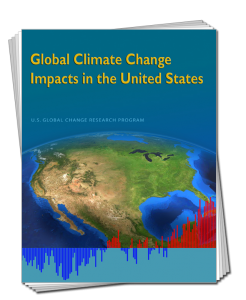White House releases climate change impacts report, prognosis grim for Western water
Posted on | June 16, 2009 | 2 Comments

Graphic: NOAA
- Regional differences in climate will become more prounounced. Rain will increase in the Northeast and Midwest and decline in much of the West, in particular the Southwest.
- Substantial changes in the water cycle are expected. A warmer climate increases evaporation of water from land and sea and allows more moisture to be held in the atmosphere. For every 1 degree Fahrenheit in temperature, the water holding capacity of the atmosphere increases by about 4 per cent.
- Changes in atmospheric circulation will tend to move storm tracks northward, with the result that dry areas will become drier and wet areas wetter, hence the Southwest is projected to experience longer and more severe droughts.
- Increased air temperatures lead to higher water temperatures, which have already been detected in many streams, especially during low-flow periods. In lakes and reservoirs, higher water temperatures lead to longer periods of summer stratification, when surface and bottom waters do not mix. Dissolved oxygen is reduced in lakes, reservoirs and rivers at higher temperatures. Low oxygen stresses aquatic animals such as coldwater fish and the insects and crustaceons on which they feed. Lower oxygen levels also decrease the self-purification capabilities of rivers.
- The negative effects of water pollution will be amplified.
- Because climate change will significantly modify many aspects of the water cycle, the assumption of an unchanging climate is no longer appropriate for many aspects of water planning. Past assumptions derived from the historical record about supply and demand will need to be revisited.
Understanding that climate change is upon us is crucial to preparing a response, say spokespeople for the participating agencies and White House.
From the National Oceanic and Atmospheric Administration’s press release:
Responses to climate change fall into two categories. The first involves “mitigation” measures to limit climate change by reducing emissions of heat-trapping pollution or increasing their removal from the atmosphere. The second involves “adaptation” measures to improve our ability to cope with or avoid harmful impacts, and take advantage of beneficial ones. “Both of these are necessary elements of an effective response strategy,” said Jerry Melillo of the Marine Biological Laboratory in Woods Hole, MA, a report co-chair.
“By comparing impacts that are projected to result from higher versus lower emissions of heat-trapping gasses, our report underscores the importance and real economic value of reducing those emissions,” said Tom Karl, director of NOAA’s National Climatic Data Center in Asheville, N.C. and one of the co-chairs of the report. “It shows that the choices made now will have far-reaching consequences.”
The report draws from a large body of scientific information, including the set of 21 Synthesis and Assessment reports from the U.S. Global Change Research Program. The government agencies affiliated with the program include the Departments of Agriculture, Commerce, Defense, Energy, Health and Human Services, Interior, State, and Transportation; the Environmental Protection Agency; NASA; National Science Foundation; Smithsonian Institution; and the United States Agency for International Development.
The report is available for download online.
This report was updated at 9am, Wednesday June 17.
Tags: chance of rain > drought > Emily Green > National Oceanic and Atmospheric Administration
Comments
2 Responses to “White House releases climate change impacts report, prognosis grim for Western water”
Leave a Reply



August 3rd, 2009 @ 9:50 am
[…] here in the dark about one of the most urgent issues of our day: Both the White House and experts say we need to do something now to avoid chocking the planet out of existence within the next […]
November 4th, 2009 @ 7:03 pm
– Climate Change made the typhoons in the south pacific very destructive. Typhoon Ketsana made a lot of mess in Philippines and Vietnam